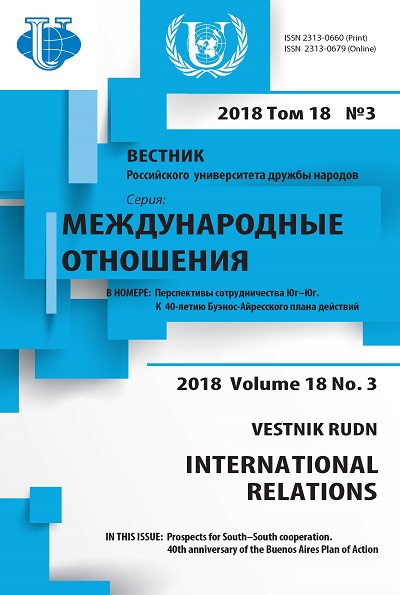CHINA IN THE STRUGGLE FOR RESOURCES IN AFRICA AND ARAB WORLD
- 作者: Deych T.L.1
-
隶属关系:
- Institute for African Studies of Russian Academy of Sciences
- 期: 卷 18, 编号 3 (2018): Prospects for South—South Cooperation. 40th Anniversary of the Buenos Aires Plan of Action
- 页面: 595-611
- 栏目: THEMATIC DOSSIER
- URL: https://journals.rudn.ru/international-relations/article/view/20106
- DOI: https://doi.org/10.22363/2313-0660-2018-18-3-595-611
- ID: 20106
如何引用文章
全文:
详细
The article is dedicated to the struggle for resources in Africa and Arab East, and especially the China’s role in this struggle. Announced by the Beijing in 2002, the course of “going abroad” was marked by the economic expansion of Chinese companies in Africa and Arab countries, largely due to the interest in raw materials, primarily in oil. At the same time, the African and Arab countries are among the foreign policy strategic priorities of the leading Western powers, whose activity in this region has also increased. As shown in the article, the competition for access to natural resources contributed to the emergence of conflicts in the region. The methodological basis of the study is a comparative political approach, methods of analysis and synthesis. The scientific novelty of the paper is that, although the problem of the struggle for resources in Africa and in Arab world is reflected in publications in our country and abroad, the peculiarities of China’s position in this matter have not been yet the object of serious research. The analysis of the topic is relevant in the conditions when Western countries attempt to regulate crises by force, often bypassing the Security Council and the UN Charter. Some analysts view the USA and NATO actions in Libya and the French campaign 2012 in Mali in the light of West desire to displace China from Africa. They also connect crisis in Syria and Iraq with US actions. As the paper shows, Beijing remains committed to the principle of non-interference in internal affairs of other states and stands for political solution of conflicts. But at the same time, it pays an increasing attention to strengthening its military presence in Africa and Arab countries. The author comes to the conclusion that the realization of the initiative “One belt - One road” increases China’s needs in resources for the implementation of ambitious projects in the space of the “belt and road”. The Western countries will resist, so the struggle for resources will not weaken.
作者简介
Tatiana Deych
Institute for African Studies of Russian Academy of Sciences
编辑信件的主要联系方式.
Email: tdeich@yandex.ru
Doctor of Sciences (History), Leading Research Fellow, Institute for African Studies of Russian Academy of Sciences, Moscow, Russian Federation
参考
- Deych, T.L. (2017). China as a Member of IGAD Plus and the Problems of South Sudan. In: The Resolving of Military-Political Conflicts in Africa and Role of Regional Organizations. Ed. by C.V. Kosteljanets, A.A. Tkachenko. Moscow: Institute for African Studies Russian Academy of Sciences, p. 98—112. (in Russian).
- Deych, T.L. & Korendyasov, E.N. (Eds.). (2011). Russia in Competitive Struggle for African Mineral Resources. Moscow: Institute for African Studies Russian Academy of Sciences, p. 47—48. (in Russian).
- GCC Trade and Investment Flows: The Energing-Market Surge. (2011). Economist Intelligence Unit (EIU). 22 March, 2011. URL: http://graphics.eiu.com/upload/eb/GCC_Trade_and_Investment_Flows_Falcon%20South_Web_22_MARCH_2011.pdf (accessed 01.03.2012).
- Ilminskaya, M.F. (2015) The Persian Gulf Region as a Field of China’s Geopolitical Interests. Vestnik RUDN. International Relations, 1, 152—161.
- Keck, Z. (2014). China and Iraq Expand Energy and Defence Ties. The Diplomat. URL: https://thediplomat.com/2014/02/china-and-iraq-expand-energy-and-defense-ties/ (accessed 12.01.2018).
- Korendyasov, E.N. (2017). 25 Years of Russian-African Relations: Results and Ways of Further Development. In: African Countries in Contemporary International Relations: New Frontiers. Moscow: Institute for African Studies Russian Academy of Sciences, p. 109—119. (in Russian).
- Ostrovsky, A.V. (2010). Potential of China in solving the energy problem. In: Energy of Russia in the XXI century: Development Strategy — the Eastern Vector. Energy cooperation in Asia: what is after the crisis? Reports of Joint Symposium, August 30 — September 3, 2010. Irkutsk: Melentiev Energy Systems Institute. Siberian Branch of the Russian Academy of Sciences. URL: http://isem.irk.ru/symp2010/papers/RUS/P2-07r.pdf (accessed 30.06.2018). (in Russian).
- Pant, H.V. & Haidar, A.M. (2017). China’s Expanding Military Footprint in Africa. ORF Issue Brief, 195.
- Rinehart, J. E. (2016). The Chinese Military Overview and Issues for Congress. Congress Research Service, 24.03.2016. URL: https: fas.org/sdp/crs/row/R44196 pdf (accessed 15.06.2016).
- Rudolf, M. (2016). China’s New Era of Diplomacy: Engaging in Syria. The Diplomat. URL: https://thediplomat.com/2016/01/chinas-new-era-of-diplomacy-engaging-in-syria/ (accessed 12.01.2018).
- Shinn, D.H. (2009). Comparing Engagement with Africa by China and the United States. China in Africa Symposium. African Studies Program, East Asian Studies Center and the Center for International Business Education and Research. Indiana University. Bloomington, Indiana. URL: https://scholarworks.iu.edu/dspace/bitstream/handle/2022/3466/China+in+Africa+Symposium+-+the+good+one.pdf;jsessionid=4D5B6F970A057F2FED20818DFAF5C775?sequence=1 (accessed 12.01.2018).
- Shinn, D.H. (2009). China’s engagement in Africa. CSIS Africa Program Report: Africa policy in the George W. Bush Years: Recommendations for the Obama Administration. URL: https://www.csis.org/programs/africa-program/archives/africa-policy-after-president-bush (accessed 12.01.2018).
- The Military Balance 2016. The Annual Assessment of Global Military Capabilities and Defence Economics. (2016). London: The International Institute for Strategic Studies.
- The Military Balance 2018. The Annual Assessment of Global Military Capabilities and Defence Economics. (2018). London: The International Institute for Strategic Studies.
- Yun, Sun. (2013). How China Views France’s Intervention in Mali: An Analysis. Brookings. URL: https://www.brookings.edu/opinions/how-china-views-frances-intervention-in-mali-an-analysis/ (accessed 12.01.2018).
补充文件








